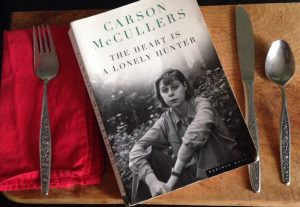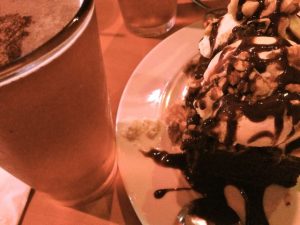~by Sherrie Flick
This is the first installment of Eat Drink Book. Each month I’ll explore food and drink in literature. This month it’s Carson McCullers’ The Heart is a Lonely Hunter. Written in 1940 when McCullers was just 23 years old this novel follows a host of townspeople and their interconnected, isolated, lonely lives. Obsessed with the dark corners of society, the slightly and overtly freakish people who inhabit the world with their fetishes and haunting thoughts, McCullers depicts people who lurk in shadows, wander into all-night restaurants like The New York Cafe.
McCullers uses food in The Heart … to help establish character, class, and setting. Singer, the character to which the other characters are drawn, the outsider (he moved to the small town from Chicago), the Jew–always has a distinguished selection of food in his small apartment. Fresh oranges and candies and wine or whiskey or gin, which he keeps neatly tucked into a closet. He serves his visitors ceremoniously. “They sat at the table and drank hot coffee out of blue cups. The room was cool and the half-drawn shades softened the hard glare from the windows. Singer brought from his closet a tin box that contained a loaf of bread, some oranges, and cheese. He did not eat much, but sat leaning back in his chair with one hand in his pocket (55-56).” Singer is a deaf mute and his silence adds to the accumulating grace. When Singer travels to visit his Greek friend Spiros Antonapoulos he brings a brightly wrapped fruit basket, a box of walnut-sized just-ripe strawberries. When he checks into his hotel room, he orders room service, a decadent combination of “…broiled bluefish, hominy, French toast, and hot black coffee.”
In contrast, Mick the young girl who serves as the dominant voice of the book lives in a rooming house run by her parents. Because it was too hot to drink coffee, “she had ice water syrup in it and cold biscuits” and dreams of stealing candy from The New York Cafe, some green wintergreen candy.
Food helps guide us through this southern mill town, from the African-American community where Mr. Copeland (a vegetarian) eats collards and his daughter Portia sips her coffee from a saucer to Biff’s restaurant The New York Cafe where veal stew is eaten alongside nickel drafts of beer. In witnessing the characters eat and drink (and everyone drinks a lot) we understand them more.
A food scene that I like comes near the end of the book. Fourteen-year-old Mick has recently taken a job at Woolworth’s and is wearing stockings and some earrings that pinch her ears. She enters Biff’s crowded restaurant and takes a booth at the back, by herself. She wants to get away, to think through the recent suicide of her friend, Singer. She eases into the booth and says, “I want me a chocolate sundae and a nickel glass of draw beer (351).”
I ventured out to try this combination for myself, to think a little about Mick and why it appealed to her. It was late afternoon on a Tuesday in October in Pittsburgh, not exactly the late August day in small-town Georgia, but it was a dark restaurant and I did slide into a wooden booth.
My first disappointment was I couldn’t get cherries. No cherries at the restaurant, not even at the bar. But the server set down a thin, yellow draft of Yuengling beer and a sundae with vanilla ice cream, chocolate sauce and nuts–nearly Mick’s order (I ignored the brownie under the ice cream, my second disappointment). I tasted the sundae–the thin, nostalgic Hershey’s chocolate sauce, nearly metallic in its sweetness; crunchy walnuts, sharp cold ice cream. Everything sweet and crunchy. I sipped my beer, a sharp, bitter contrast.
And it made sense to me–Mick’s order that August in Georgia, 1939. No air conditioning, wearing pantyhose with a run and a skirt, coming into The New York Cafe after a long day’s work. Of course she declined the roast chicken. It’s hot. She’s still clinging to her childhood. She wants ice cream and she has some money to buy it. She wants beer, because she’s a working woman and deserves it. Her friend has just killed himself and she’s confused and sad and mourning. And in its flavorful contrasts, it’s a surprisingly satisfying experience. Sweet then bitter, crunch then tang. I imagine Mick’s water glass sweating, her thinking, “Next to music beer was best (353).” The ceiling fans idly swinging overhead. Biff reading the newspaper up at the register. Mick ready to “smoke and be by herself for a little while (351).”
McCullers, Carson. The Heart is a Lonely Hunter, First Mariner Books edition (2000), NY, 1940.
***
![[PANK]](https://pankmagazine.com/wp-content/themes/pank/assets/images/pank-logo-large.png)


